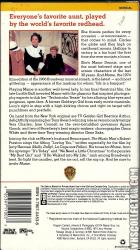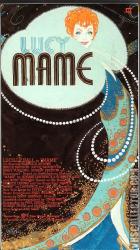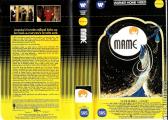Mame
Catalog Number
11100
-
Primary Distributor (If not listed, select "OTHER")
Catalog Number
11100
Primary Distributor (If not listed, select "OTHER")
Release Year
Country
132 mins (NTSC)
N/A | N/A | N/A
N/A | N/A
Mame (1974)
Additional Information
Additional Information
She'll coax the blues right out of your heart!
Lucille Ball stars in this film version of the hit Jerry Herman Broadway musical, which featured an electrifying performance by Angela Lansbury. As Patrick Dennis' plucky and resilient Auntie Mame, Ball's low-pitched, growling moan of a voice (a spine-chilling reminder of the sound of Linda Blair's demon-possession in The Exorcist) and her gaudy and lumbering fashion-horse gait turns Mame into an elderly cross-dresser. In this guise, Mame rehashes the plot from Dennis's novel and the previous non-musical Rosalind Russell film. During the Depression era 1930s, she enrolls her nephew into a liberal private school, tries a turn in show business (with the help of her friend Vera [Beatrice Arthur]), and marries a well-to-do Southern planter (Robert Preston). After her husband's death, Mame concerns herself with her now grown-up nephew, his girlfriend, and the girlfriend's intolerant parents
Mame is a 1974 musical film based on the 1966 Broadway musical of the same name and the novel by Patrick Dennis, directed by Gene Saks, written by Paul Zindel, and starring Lucille Ball in her final film performance.
Warner Bros. executives were concerned that Angela Lansbury, who had originated the title role on Broadway, had not yet captured the attention of the general public since she was mainly a Broadway star at this point (although she had starred in Disney's live-action/animated musical "Bedknobs and Broomsticks" in 1971 and was a three-time Oscar nominee for "The Manchurian Candidate", "Gaslight", and "The Picture of Dorian Gray").
The cast also features Beatrice Arthur, Bruce Davison and Robert Preston.
The film focuses on eccentric Mame Dennis, whose madcap life is disrupted when her deceased brother's son Patrick is entrusted to her care. Rather than bow to convention, Mame introduces the boy to her free-wheeling lifestyle, which includes his nanny Agnes Gooch and Mame's husband Beauregard Jackson Pickett Burnside, a Southern aristocrat with a Georgia plantation called Peckerwood.
Radio City Music Hall selected the film to be its Easter attraction. The film broke box-office records in its run at Radio City, but many reviews, particularly those for Ball, were brutal, and the movie has 29% on Rotten Tomatoes. Time Magazine said, "The movie spans about 20 years, and seems that long in running time . . . Miss Ball has been molded over the years into some sort of national monument, and she performs like one too. Her grace, her timing, her vigor have all vanished." [1] Time Out London declared she "simply hasn't the drive and steel of a Rosalind Russell, an Angela Lansbury or a Ginger Rogers, all of whom played the part before her," and said of Saks, "When he's not ogling his star in perpetual soft focus and a $300,000 fashion parade, [he] fails to get enough retakes, match his shots, or inject the essential vim." [2] Pauline Kael in The New Yorker wondered, "After forty years in movies and TV, did she discover in herself an unfulfilled ambition to be a flaming drag queen?" The New Republic's Stanley Kauffman, though he pointed out that Ball would have made a perfect Mame had she played the role "fifteen years earlier," described her as "too old, too stringy in the legs, too basso in the voice, and too creaky in the joints." Virtually every critic took notice of the heavy-handedness in photographing Ball out of focus, Rex Reed going so far as to suggest, albeit jokingly, that chicken fat was put over the lens. Some regarded this as evidence that those executives responsible for signing Ball, and Ball herself, knew from the outset that she was too old for her role. In her defense in regards to her lack of singing ability, Ball told one interviewer "Mame stayed up all night and drank champagne! What did you expect her to sound like? Julie Andrews?".[citation needed]
In his Movie Guide, critic Leonard Maltin rated the film as "BOMB" and wrote: "Hopelessly out-of-date musical ... will embarrass even those who love Lucy. Calling Fred and Ethel Mertz!"[2]
Not all the reviews were bad. Vincent Canby in the New York Times, for example, expressed "great reservations" about the film and Ball's close-ups, but noted that the film is "as determined to please in its way as Mame is in hers" and that the opening credits, "which look like a Cubist collage in motion, are so good they could be a separate subject." Canby went on to praise Ball as well: "When the character of Lucy, an inspired slapstick performer, coincides with that of Auntie Mame, the Big-Town sophisticate, 'Mame' is marvelous. I think of Lucy's turning a Georgia fox hunt into a gigantic shambles, or of her bringing the curtain down on a New Haven first-night when, as a budding actress, she falls off a huge cardboard moon. I even treasure her prying loose the fingers of a sloshed Beatrice Arthur who won't give up her martini glass."[3] Variety reported that the film is "why movies were invented" and added that "Lucille never looked lovelier." Molly Haskell in the Village Voice was "pro-Ball but anti-'Mame'" and felt that Lucy made the character of Mame—someone "you'd walk a mile to avoid" in real life—palatable. In the March 18, 1974 issue of New York Magazine, Judith Crist was similarly displeased with the film but supportive of its star: "Lucille Ball is--and no 'still' about it--a first-rate entertainer, supplementing her superb comedic sense with a penetrating warmth and inner humor. She is without peer in making a hung-over stagger from bed to bathroom an exercise in regal poise, in using her slightly crooked smile to vitiate the soppiness of an overly sentimental sequence, in applying her Goldwyn Girl chorine know-how to a dash of song and dance." Milton Krims, the film critic for The Saturday Evening Post, wrote (in the magazine's March 1974 issue) a breathless paean to Lucille Ball and the film, concluding that "Mame is Lucille Ball and Lucille Ball is Mame."
The Hollywood Foreign Press Association awarded Ball a Golden Globe nomination (Arthur received one as well) but, disheartened by its reception, she swore she never would appear on the big screen again, and the film proved to be her last theatrical film (not counting Stone Pillow, her 1985 made-for-TV film).
Beatrice Arthur later called her involvement with the film a "tremendous embarrassment" and expressed regret at having participated. Although she enjoyed working with Lucille Ball, she made no secret of her opinion that Lucy was "terribly miscast".
Release Date: March 7, 1974 @ Radio City Music Hall
Distrib: Warner Brothers
Boxoffice: $6,500,000
Lucille Ball stars in this film version of the hit Jerry Herman Broadway musical, which featured an electrifying performance by Angela Lansbury. As Patrick Dennis' plucky and resilient Auntie Mame, Ball's low-pitched, growling moan of a voice (a spine-chilling reminder of the sound of Linda Blair's demon-possession in The Exorcist) and her gaudy and lumbering fashion-horse gait turns Mame into an elderly cross-dresser. In this guise, Mame rehashes the plot from Dennis's novel and the previous non-musical Rosalind Russell film. During the Depression era 1930s, she enrolls her nephew into a liberal private school, tries a turn in show business (with the help of her friend Vera [Beatrice Arthur]), and marries a well-to-do Southern planter (Robert Preston). After her husband's death, Mame concerns herself with her now grown-up nephew, his girlfriend, and the girlfriend's intolerant parents
Mame is a 1974 musical film based on the 1966 Broadway musical of the same name and the novel by Patrick Dennis, directed by Gene Saks, written by Paul Zindel, and starring Lucille Ball in her final film performance.
Warner Bros. executives were concerned that Angela Lansbury, who had originated the title role on Broadway, had not yet captured the attention of the general public since she was mainly a Broadway star at this point (although she had starred in Disney's live-action/animated musical "Bedknobs and Broomsticks" in 1971 and was a three-time Oscar nominee for "The Manchurian Candidate", "Gaslight", and "The Picture of Dorian Gray").
The cast also features Beatrice Arthur, Bruce Davison and Robert Preston.
The film focuses on eccentric Mame Dennis, whose madcap life is disrupted when her deceased brother's son Patrick is entrusted to her care. Rather than bow to convention, Mame introduces the boy to her free-wheeling lifestyle, which includes his nanny Agnes Gooch and Mame's husband Beauregard Jackson Pickett Burnside, a Southern aristocrat with a Georgia plantation called Peckerwood.
Radio City Music Hall selected the film to be its Easter attraction. The film broke box-office records in its run at Radio City, but many reviews, particularly those for Ball, were brutal, and the movie has 29% on Rotten Tomatoes. Time Magazine said, "The movie spans about 20 years, and seems that long in running time . . . Miss Ball has been molded over the years into some sort of national monument, and she performs like one too. Her grace, her timing, her vigor have all vanished." [1] Time Out London declared she "simply hasn't the drive and steel of a Rosalind Russell, an Angela Lansbury or a Ginger Rogers, all of whom played the part before her," and said of Saks, "When he's not ogling his star in perpetual soft focus and a $300,000 fashion parade, [he] fails to get enough retakes, match his shots, or inject the essential vim." [2] Pauline Kael in The New Yorker wondered, "After forty years in movies and TV, did she discover in herself an unfulfilled ambition to be a flaming drag queen?" The New Republic's Stanley Kauffman, though he pointed out that Ball would have made a perfect Mame had she played the role "fifteen years earlier," described her as "too old, too stringy in the legs, too basso in the voice, and too creaky in the joints." Virtually every critic took notice of the heavy-handedness in photographing Ball out of focus, Rex Reed going so far as to suggest, albeit jokingly, that chicken fat was put over the lens. Some regarded this as evidence that those executives responsible for signing Ball, and Ball herself, knew from the outset that she was too old for her role. In her defense in regards to her lack of singing ability, Ball told one interviewer "Mame stayed up all night and drank champagne! What did you expect her to sound like? Julie Andrews?".[citation needed]
In his Movie Guide, critic Leonard Maltin rated the film as "BOMB" and wrote: "Hopelessly out-of-date musical ... will embarrass even those who love Lucy. Calling Fred and Ethel Mertz!"[2]
Not all the reviews were bad. Vincent Canby in the New York Times, for example, expressed "great reservations" about the film and Ball's close-ups, but noted that the film is "as determined to please in its way as Mame is in hers" and that the opening credits, "which look like a Cubist collage in motion, are so good they could be a separate subject." Canby went on to praise Ball as well: "When the character of Lucy, an inspired slapstick performer, coincides with that of Auntie Mame, the Big-Town sophisticate, 'Mame' is marvelous. I think of Lucy's turning a Georgia fox hunt into a gigantic shambles, or of her bringing the curtain down on a New Haven first-night when, as a budding actress, she falls off a huge cardboard moon. I even treasure her prying loose the fingers of a sloshed Beatrice Arthur who won't give up her martini glass."[3] Variety reported that the film is "why movies were invented" and added that "Lucille never looked lovelier." Molly Haskell in the Village Voice was "pro-Ball but anti-'Mame'" and felt that Lucy made the character of Mame—someone "you'd walk a mile to avoid" in real life—palatable. In the March 18, 1974 issue of New York Magazine, Judith Crist was similarly displeased with the film but supportive of its star: "Lucille Ball is--and no 'still' about it--a first-rate entertainer, supplementing her superb comedic sense with a penetrating warmth and inner humor. She is without peer in making a hung-over stagger from bed to bathroom an exercise in regal poise, in using her slightly crooked smile to vitiate the soppiness of an overly sentimental sequence, in applying her Goldwyn Girl chorine know-how to a dash of song and dance." Milton Krims, the film critic for The Saturday Evening Post, wrote (in the magazine's March 1974 issue) a breathless paean to Lucille Ball and the film, concluding that "Mame is Lucille Ball and Lucille Ball is Mame."
The Hollywood Foreign Press Association awarded Ball a Golden Globe nomination (Arthur received one as well) but, disheartened by its reception, she swore she never would appear on the big screen again, and the film proved to be her last theatrical film (not counting Stone Pillow, her 1985 made-for-TV film).
Beatrice Arthur later called her involvement with the film a "tremendous embarrassment" and expressed regret at having participated. Although she enjoyed working with Lucille Ball, she made no secret of her opinion that Lucy was "terribly miscast".
Release Date: March 7, 1974 @ Radio City Music Hall
Distrib: Warner Brothers
Boxoffice: $6,500,000
Related Links
Related Releases1
Catalog Number
11100
Primary Distributor (If not listed, select "OTHER")
Mame (1974)
Release Year
Catalog Number
11100
Primary Distributor (If not listed, select "OTHER")
Catalog Number
11100









Comments0
Login / Register to post comments